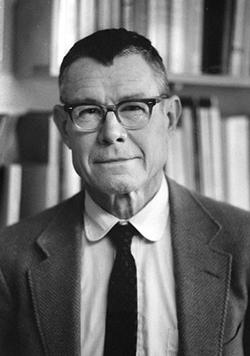The Weatherhead Center for International Affairs solemnly acknowledges the loss of one of its founders, Thomas C. Schelling
 A Nobel Prize-winning economist and arms control theorist during the Cold War, Schelling passed away on December 13, at the age of 95.
A Nobel Prize-winning economist and arms control theorist during the Cold War, Schelling passed away on December 13, at the age of 95.
“Tom was not only a brilliant economist, he was a delightful colleague who was a crucial part of the founding faculty of the Center,” remembers Joseph S. Nye, Jr., Faculty Associate, who joined the CFIA in 1961 as a research assistant.In 1958, Schelling, along with Robert R. Bowie, Henry A. Kissinger and Edward S. Mason, cofounded the Center for International Affairs at Harvard as a home for basic research in international relations, at a time when academia did not recognize the legitimacy of this discipline. Schelling and his colleagues at the Center were committed to nurturing a generation of leaders who would be knowledgeable about other nations and their policies. When he arrived at Harvard, international relations was represented by its Russian Research Center. Indeed, the times had called for the need to study the country’s main adversary, but Schelling and his colleagues understood that broadening scholarship in international relations would be a strategic advantage beyond any outcomes with the Soviet Union.
While at the Center, Schelling expanded his scholarship of political-military issues, and with support from the National Science Foundation began his decades-long fascination with the application of game theory to military interactions. With the advent of nuclear arms, the rules of traditional engagement had been rendered obsolete. Schelling made his thinking transparent and accessible to everyone. He was known for creating models and games that simulated the different sides of a conflict.
Schelling’s theories on the behavioral strategies in nuclear war shaped the course of events in the Kennedy administration during the height of the Cold War. His work in game theory is credited for calming tensions during this period by providing a plausible explanation for a continued mutual stand-off. Most notably, he showed how tacit cooperation can emerge between two conflicting parties.
“Tom Schelling, one of the great minds at Harvard, was a wonderful human being, always helpful to his younger colleagues. The rigor with which he applied rationality to the analysis of international politics is unforgotten and in fact changed strategic thinking on nuclear strategy for the benefit of world peace,” says Karl Kaiser, Senior Associate, Program on Transatlantic Relations.
Schelling began his academic career as a professor of economics at Yale in 1953. Before coming to Harvard, he helped administer the Marshall Plan in Paris and Copenhagen and helped negotiate foreign aid programs in Washington, DC. At RAND, he studied nuclear weapons strategy and made important contacts, many of whom he would invite to become colleagues at the Center. By joining the Center in 1958, he expected to establish an academic career then go back to government, which he never did. He became a faculty member of the John F. Kennedy School of Government in 1969 and left in 1990 to join the University of Maryland School of Public Policy. In 2005 he was awarded the Nobel Prize in Economic Sciences, along with Robert Aumann, for his pioneering work in game theory, a key subject of his 1960 book The Strategy of Conflict. Schelling worked on this book at the Center, which published it formally under its auspices.
Later in his career Schelling applied behavioral analysis to problems such as racial segregation, addiction, and climate change. Some of his research concepts have become part of common parlance. He is credited for using the term “tip point” to describe the dynamic of whites moving out of racially mixed neighborhood to avoid minority status. The familiar phrase “collateral damage” became widely used after it first appeared in Schelling’s 1961 paper titled “Dispersal, Deterrence, and Damage.” Schelling entered the realm of popular culture when he consulted with director Stanley Kubrick to conceptualize the “doomsday machine” for the 1964 movie Dr. Strangelove.
Kennedy School colleague Dani Rodrik remembers Schelling as one of the giants in his field. “He was one of the most original, brilliant minds I have ever encountered. Once you grasped the deep insights in his work, they changed the way you think forever. There are few scholars about whom you can say: if he had not been around, our understanding of the world would have been far more incomplete.”
—Michelle Nicholasen, Communications Specialist, Weatherhead Center for International Affairs
In the Media
- The New York Times
- The Washington Post
- Harvard Gazette
- Financial Times
- Boston Globe
- The Economist
- The Wall Street Journal
Photo Caption
Harvard University's Lucius N. Littauer Professor of Political Economy, Emeritus, Thomas Schelling in a file photo from 1983. Photo credit: Harvard News Office

